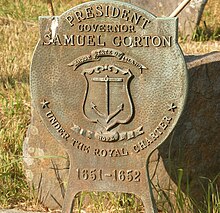Samuel Gorton | |
|---|---|
 Samuel Gorton governor's medallion | |
| 5th President of Providence and Warwick | |
| In office 1651–1652 | |
| Preceded by | Nicholas Easton (as President of all four towns of the Colony of Rhode Island and Providence Plantations) |
| Succeeded by | John Smith |
| Personal details | |
| Born | baptized 12 Feb 1592/3[a] Manchester, Lancashire, England |
| Died | by 10 December 1677 Warwick, Colony of Rhode Island and Providence Plantations |
| Resting place | Samuel Gorton Cemetery, Warwick, Rhode Island |
| Spouse | Mary Mayplett |
| Children | 9 |
| Education | Private tutors |
| Occupation | Clothier, assistant, president, commissioner, deputy |
| Signature |  |
Samuel Gorton (1593–1677) was an early settler and civic leader of the Colony of Rhode Island and Providence Plantations and President of the towns of Providence and Warwick. He had strong religious beliefs which differed from Puritan theology and was very outspoken, and he became the leader of a small sect known as Gortonians, Gortonists, or Gortonites. As a result, he was frequently in trouble with the civil and church authorities in the New England colonies.
Gorton was baptized in 1593 in Manchester, Lancashire, England and received an education from tutors in languages and English law. In 1637, he emigrated from England, settling first in Plymouth Colony, where he was soon ousted for his religious opinions and his demeanor towards the magistrates and ministers. He settled next in Portsmouth where he met with a similar fate, being whipped for his insubordination towards the magistrates. He next went to Providence Plantations where he once again encountered adverse circumstances, until he and a group of others purchased land from the Narragansett people. They settled south of the Pawtuxet River in an area which they called Shawomet.
Gorton refused to answer a summons following the complaints of two Indian sachems about being unfairly treated in a land transaction. He and several of his followers were forcefully taken away to Massachusetts, where he was tried for his beliefs and writings rather than for the alleged land transaction. He was sentenced to prison in Charlestown, though all but three of the presiding magistrates voted to give him the death sentence.
After being released, Gorton and two of his associates sailed to England where they obtained an official order of protection for his colony from the Earl of Warwick. During his stay in England, he was also very active in the Puritan underground, preaching in churches and conventicles known for their extreme religious positions. Once back in New England, he changed the name of Shawomet to Warwick in gratitude to his patron in England. He became part of the very civil authority which he had previously rejected, serving as an assistant, commissioner, deputy, and president of the two towns of Providence and Warwick.
He wrote a number of books, two of them while in England and several others following his return. He was a man of great learning and great intellectual breadth, and he believed passionately in God, the King, and the individual man; but he was harshly critical of the magistrates and ministers who filled positions that he considered meaningless. His beliefs and demeanor brought him admiration from his followers but condemnation from those in positions of authority, and he was reviled for more than a century after his death. In more recent times, some historians and writers have looked upon him more favorably, and some now consider him to be one of the great colonial leaders of Rhode Island.
© MMXXIII Rich X Search. We shall prevail. All rights reserved. Rich X Search
